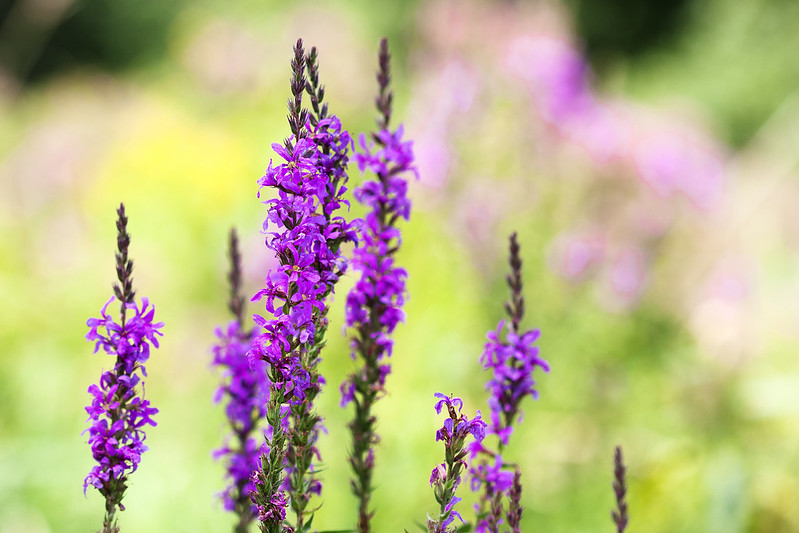Crowd Hydrology Wrapped Up!
Our Boyne River crowd hydrology project wrapped up in the fall of 2024. In ten successful years of citizen scientists texting river water data to a computer, 1,892 water level observations were submitted. Supported by a National Science Foundation grant, five faculty members from four universities used the project as a case study on how to use citizen scientist data to run numerical models to forecast hydrologic events. The project supported seven papers in scientific literature. Thank you to everyone who helped, especially to citizens who took time to text. This experiment in social interaction is a model of possibilities.
Read the summary letter by lead professor Chris Lowry on the FoBR crowd hydrology project.
Purple Loosestrife Control
In June, we hope the invasive loosestrife will meet its natural deterrent, Galerucella calmariensis! These are beetles that FoBR has ordered through the Tip of the Mitt Watershed Council’s invasives elimination program. The leaf-eaters seriously affect growth and seed production by feeding on the leaves and new shoot growth of purple loosestrife plants. They eat themselves out of food and then die. The size of a peppercorn, the beetles will arrive in early June in a dormant state for immediately released on Boyne River’s purple loosestrife.
Interested in purchasing beetles for loosestrife on your shoreline or wetland? Contact Tip of the Mitt Watershed Council for quantity and cost details. For more on beetles and purple loosestrife: www.watershedcouncil.org/purple-loosestrife.

Other Environmental Issues
Be Aware of Sealcoat Toxins!! To Learn More, Follow this Link.
Microbeads in Our Lakes!! See Plagued by Plastics.
Keep the Boyne River Tangle Free!
Thanks to the partnership of Tip of the Mitt Watershed Council and the Boat U.S. Foundation’s “Reel In and Recycle!” campaign, the Friends of the Boyne Riverwere able to install a new monofilament collection container along the Boyne River. The program was designed to make proper disposal of monofilament more accessible to anglers on our local lakes and streams. When improperly discarded, the line can fatally entangle wildlife and is a danger to boaters and swimmers.
Widely used by anglers, monofilament is a strong, thin, durable line that is nearly invisible in the water. However, those same qualities can make it extremely hazardous to wildlife when left behind. According to the Michigan Clean Marina website, “it is estimated that ingestion of, and entanglement in, marine debris causes the deaths of more than 1 million birds and 100,000 marine mammals each year.” Inappropriately discarded monofilament often accumulates in popular fishing areas and may tangle around boat propellers and aquatic life, while taking over 500 years to decompose.
Can’t find a collection bin? Anglers can also mail used monofilament line directly to Berkley’s Monofilament Recycling Center at the following address: Berkley Recycling, 1900 18th Street, Spirit Lake, IA 51360 or call 1-800-237-5539 to request a free, pre-addressed postage paid box for the return of used fishing line and spools.
Dumping Your Drugs? Don’t Flush Them Away
Your toilet bowl may be the time-honored venue for dumping expired or unused drugs, but your local waterways could suffer for it. The U.S. Geologic Survey has been studying the nation’s waterways for years, and an exhaustive study in 2002 detected trace levels of chemicals commonly found in prescription drugs in 80 percent of the streams tested across the country. Now, under pressure from researchers who suspect hormones and antidepressants may be responsible for harming fish, the U.S. Environmental Protection Agency is on the march to gauge the health and environmental impact of pharmaceuticals in water. In the last year, says EPA press officer Suzanne Ackerman, the agency has made some “groundbreaking” advances and is testing methods that may be effective in removing pharmaceuticals from the water. The going is slow, she concedes, but “it’s happening.” Meanwhile, what should you do with your unused drugs? There are no government guidelines, so pharmaceutical experts recommend.
Find out if your local pharmacies take back medications. Some have occasional days designated for such drop-offs. Check to see whether your area has a community household hazardous waste collection program. Go to www.epa.gov/epahome/state.htm for local numbers.
reprinted with permission from the AARP Bulletin, January 2007
